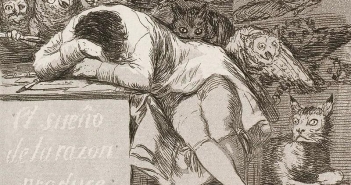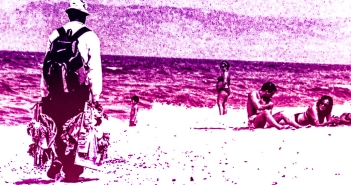An grá is an gráin, say these two words out loud, say them out loud to yourself, out loud to the listening others around, and feel in your mouth how subtle the shift is between them; how the open mouth of love — grá — gets slighted by the brush of your tongue’s curled tip shaping hate — gráin; feel the quick lick it gives the roof of your mouth. It’s that kind of sliver, isn’t it, the one we know to be true; the one that suddenly shifts the friend or the lover to the one we don’t know or want to know. In shape and in sound, there in your mouth, Irish gathers together a distinction of meaning in a unity of resonance. Where the mind of English fragments and scatters, (say them too out loud, say love, say hate), Irish holds in an elemental poetry we need to participate in to sense.
Sometimes what language teaches us can be that visceral.
I am digging words in the Burren when I hit upon this realisation —
tá go leor eile, more abound, Siobhán chirps; an saoirse is an daoirse, an solas is an dolas; seo é an fhilíocht nádur atá le fáil sa teanga! Siobhán is leading us in an archaeological word excavation, amuigh san aer i gciorcal Hedge School, uncovering from Irish some sense of a way of being in the world we have only just forgotten. If we lost it in a generation, we can reclaim it in a generation. Dictionaries are scattered all around, I hold one in my lap, but there is no discussion here of the tuiseal ginideach, we are not being questioned about the modh coinniollach and all mentions of Peig are with endearment and jest. We are just picking words at random and letting the connective threads be woven from there and we weave them without trying. It feels illicit to use a dictionary in this way, and I love it. Here a space is opened of pure play, without the plámás of getting anything right. Here the severed head of Irish we suffered in school is reunited with our bodies — the vibrations in Irish are cosúil le Sanskrit — tugann sí fuinneamh láidir duit. Just feel and the rest will follow; this seems to be the unspoken mantra of the Wild Irish Retreat weekend.
Earlier that morning, the sun rising from behind Slieve Elva, Cearbhuil leads the women down to the hazel wood chun macnamih a dheanamh, to meditate, and we follow, trusting this woman who is keeper of this land; and we go down to the hazel wood, and there’s a stillness in our hearts. We’ve been invited to observe a noble silence and so our passage through the curly tendrils is punctuated only by snaps of twigs, the brush of branches newly leafing and birdsong from birds I have no name for, not in either tongue. And we pause then as Cearbhuil stops and simply says — éist — just listen. No crossed legs, no chanting, nothing specific to learn, we are simply tuning in to what is here, all around us; we are simply letting our civilised bodies contact the coill, and letting the coill touch deep into us. And later, when Cearbhuil leads us again, now through a forage walk on the land chun lón a sholáthar, we listen then too, not just to the names that fall like small prayers to all the invisible Gods, slanlóg, nóinín, neantóg, casairbháin, but to all the reverence is an méad meas atá ann in this woman’s gestures; we’re listening to all the wisdom in her fingers that know when to pluck, what to leave and how to reap without plundering. It is simple, even obvious, and so all the more unbelievable that we need to be shown how to see what is in front of us and all around us; an leigheas is an maitheas ag fás go fiáin. As if nothing has happened, all the goodness and plenitude of the land is still offered— here, the seamsóg extends itself —here, the seamair dhearg —had we but sense and right vision to see. Tá gach rud fós ann, I hear whispered in my head.
I spoke of these Iseas in Croke Park recently, ideas that have been forming around me and inside of me that were inspired by John Moriarty and my experience of hurling. He gave me leave to understand the world for myself, deferring to no one.https://t.co/b5U0XPU5FD
— Diarmuid Lyng (@diarmuidlyng) April 5, 2021
And then on the beach with Diarmuid, the same principles we have absorbed from Siobhán and Cearbhuil without any direct tutelage apply now to the game of hurling; listen, play, be here in your body. There are real players on the trá, none more so than Diarmuid who seems to skip through the sand goat-like, whilst my legs are heavy pillars that have to be heaved and hefted to keep up with the ball. But this game is not about cé mhéad blianta atá ar do dhroim; it’s not about how many times you’ve kitted out in any coloured jersey. Here, now, with the crashing waves of Fanore in our ears, we return to the pleasure of simply pucking a ball. We léim go hard, we scuttle for the liathróid, we roar anseo to each other, and when we scramble too fast ahead of ourselves, get too caught up in a race to get, Diarmuid beckons us to stop and asks us to check in with ourselves; éistigí cad atá ar siúl i do chorp. Stay with the place of ease, cé comh éasca can you make it lads, don’t strain. And while there may be taithí go leor leis an cluiche ar cuid daoine, none of us have much experience in that. Play till you’re played out; win at whatever cost. Something in us knew that wasn’t the way it had to be, but we had no guidance in respecting the rhythm of our nádur; how to join effort with ease, doing with non-doing. And then, as if in an ancient ritual of bowing to our human limitation, when the hurls are finally cast aside, we throw ourselves into an Atlantach fiáin herself; engulfed in the white and the rush of her embrace; tógtha.
Of course, there is much more that could be shared here about cad atá ar siúl leis an Wild Irish Retreats. I could tell you about the food, not just cé comh blásta is atá sé, but how it is prepared with such care and attention; slow cooking at its finest. And even more, how it is served to you, with grace and kind eyes; accompaniments you didn’t know you needed and that nourish far into the depths of you. And the music, and the fire, and the joy of being together at last. But I am not offering an advertisement here. If this sounds like a sale’s pitch, it isn’t. If you think I’m trying to convince you of something, I’m not. The arguments for Irish are many; many more those for how to rescue ourselves from our current catastrophe and our abominable alienation from the land. This is not a proof, nor is it a plea, this is simply a love song; a song of praise. This is just a need to acknowledge my luck of having returned home, after many years away, to find myself among mo mhuintir arís, ag caint as gaeilge, le mo dhá chosa ar an talamh. This is just to sing that it feels like a dream I am still not waking from; to sing because it is hard to say what it has all opened in me, because I feel it to be opening still. I offer these words as a return song then, a homecoming tune for the other way; what these wild Irish legends are demonstrating. There’s nothing you need to know, nothing to do, nothing to fix, there’s just letting go; there’s just peeling back the thick layers of our resistance, our wilful control, so that other dimension of our being can re-surface; the one who did not get us into this mess; the one whose skin trembles and dances with the sheer delight of being here; the one who is fós fiáin. Go down to Clare, go down to Kerry, and be with the Wild Irish Retreat folk if it calls you, if it be within your means. If it doesn’t, if you can’t, find your own way back. But claim it —claim the part of you that can’t be claimed; the place in you no worldly concern, no worry or slight of ill-will can reach; the place in you that is open, playful, fluid flúirseach. You don’t need anything special. Open your mouth, lig amach í; slip back i ngrá




